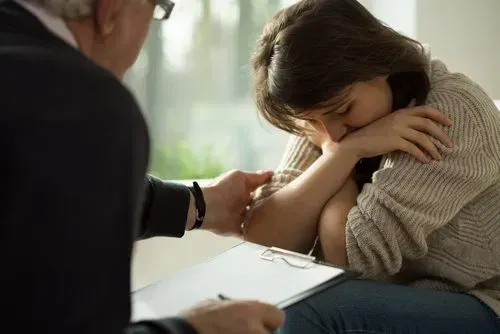Bipolar Disorder in Lexington, Richmond & Frankfort KY
What is Bipolar Disorder?
Bipolar disorder, also known as manic-depressive illness, is a chronic mental illness that causes dramatic shifts in a person’s mood, energy, activity level and ability to think clearly or carry out day-to-day tasks. People with bipolar disorder have high and low moods, known respectively as manic episodes and depressive episodes, which are much more severe than the normal ups and downs that most people experience. Bipolar disorder symptoms can result in damaged relationships, poor job or school performance, and even suicide. However, with a good treatment plan and self-management, people suffering from this illness can live full and productive lives.
Signs & Symptoms
People with bipolar disorder usually experience intense emotional states that occur in distinct periods called “mood episodes,” that represents a drastic change from a person’s usual mood or behavior. An overly joyful or overexcited state is called a manic episode, and an extremely sad or hopeless state is called a depressive episode. People’s symptoms and the severity of the mania and depressive episodes can vary widely.
Common symptoms of bipolar disorder are described below:
Symptoms of a manic episode include:
Mood Changes
- A long period of feeling "high," or an overly happy or outgoing mood
- Extreme irritability
Behavioral Changes
- Talking very fast, jumping from one idea to another, having racing thoughts
- Being easily distracted
- Increasing activities, such as taking on new projects
- Being overly restless
- Sleeping little or not being tired
- Having an unrealistic belief in one's abilities
- Behaving impulsively and engaging in pleasurable, high-risk behaviors
Symptoms of a depressive episode include:
Mood Changes
- An overly long period of feeling sad or hopeless
- Loss of interest in activities once enjoyed, including sex.
Behavioral Changes
- Feeling tired or "slowed down"
- Having problems concentrating, remembering, and making decisions
- Being restless or irritable
- Changing eating, sleeping, or other habits
- Thinking of death or suicide, or attempting suicide.
Occasionally, people with severe episodes of mania or depression can have psychotic symptoms, such as hallucinations or delusions, as well. This often causes bipolar disorder to be misdiagnosed as schizophrenia.
Diagnosis & Treatment Options
Bipolar disorder is diagnosed based on the Diagnostic and Statistical Manual of Mental Disorders (DSM). There are five basic types of bipolar disorder:
- Bipolar I Disorder – defined by manic or mixed episodes that last at least seven days. Usually depressive episodes occur as well, lasting at least two weeks.
- Bipolar II Disorder – defined by a pattern of depressive episodes and hypomanic episodes, but no full-blown manic or mixed episodes.
- Bipolar Disorder Not Otherwise Specified (BP-NOS) – diagnosed when symptoms of the illness exist but do not meet diagnostic criteria for either Bipolar I or II.
- Cyclothymic Disorder, or Cyclothymia – a mild form of bipolar disorder with episodes of hypomania and mild depression that last for at least 2 years.
- Rapid-Cycling Bipolar Disorder - occurs when a person has four or more episodes of major depression, mania, hypomania, or mixed states within a year. Rapid cycling can come or go, but occurs more frequently when onset occurs at a younger age.
Bipolar disorder cannot be cured, but it can be treated effectively over the long-term. Proper treatment helps many people gain better control of their mood swings and related symptoms, using one of the following options or a combination of them.
- Medications – various medications include mood stabilizers, antipsychotic medications, and antidepressants
- Psychotherapy – various types of therapy can be used, including cognitive behavioral therapy (CBT), family-focused therapy, interpersonal and social rhythm therapy, and psychoeducation.
- Electroconvulsive therapy (ECT)
- Self-management strategies and education
- Complementary health approaches, such as meditation, faith and prayer
There Is Hope!
If you suffer from bipolar disorder or know someone who does, the most important thing you can do is get the right diagnosis and treatment. Talk to your doctor about treatment options and programs available to you. Seek out mental health specialists, such as psychiatrists, psychologists, social workers or mental health counselors.
For more information, do not hesitate to call our office and set up an appointment or visit one of these websites.
New Client Info
Lexington, KY
Darby Creek Location
501 Darby Creek Road
Suite 11
Lexington KY, 40509
Phone:
859-338-0466
Fax:
859-294-0802
All Locations
LIST
MAP
- Darby Creek Lexington, KY 501 Darby Creek Road, Lexington, KY, United States
- Duval Street Location Lexington, KY 1092 Duval Street, Lexington, KY, United States
- Frankfort, KY 105 Diagnostic Dr, Frankfort, KY 40601, United States
- 1043 Center Dr, Richmond, KY 40475, United States 1043 Center Dr, Richmond, KY 40475, United States
Recent Posts
What is therapy?
Therapy is more long-term than counseling and focuses on a broader range of issues. The underlying principle is that a person's patterns of thinking and unconscious awareness affect the way that person interacts with the world. The goal is to uncover those patterns and become aware of their effect and then learn new, healthier ways to think and interact.








